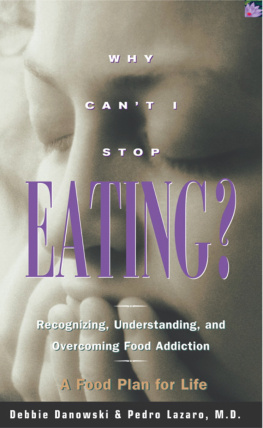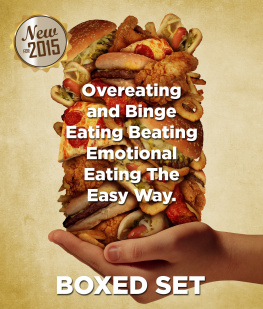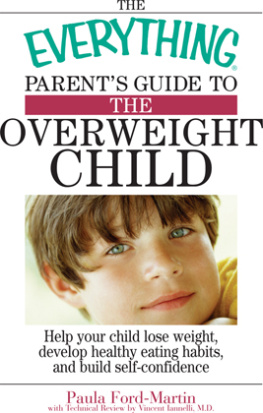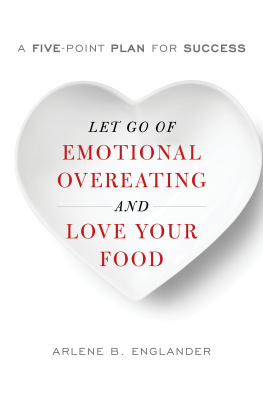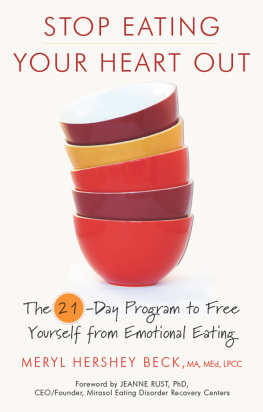

DEBBIE DANOWSKI
CENTRAL RECOVERY PRESS

Central Recovery Press (CRP) is committed to publishing exceptional materials addressing addiction treatment, recovery, and behavioral healthcare topics, including original and quality books, audio/visual communications, and web-based new media. Through a diverse selection of titles, we seek to contribute a broad range of unique resources for professionals, recovering individuals and their families, and the general public.
For more information, visit www.centralrecoverypress.com.
Central Recovery Press, Las Vegas, NV 89129
2013 by Debbie Danowski
All rights reserved. Published 2013.
No part of this publication may be reproduced, stored in a retrieval system, or transmitted in any form or by any means, electronic, mechanical, photocopying, recording, or otherwise, without the written permission of the publisher.
Publisher: Central Recovery Press
3321 N. Buffalo Drive
Las Vegas, NV 89129
Central Recovery Press makes no representations or warranties in relation to the medical information in this book; this book is not an alternative to medical advice from your doctor or other professional healthcare provider.
Characters portrayed in this book are composites, and all names thereof are fictitious.
18 17 16 15 14 13 1 2 3 4 5
ISBN: 978-1-937612-28-3 (e-book)
Publishers Note: Central Recovery Press books represent the experiences and opinions of their authors only. Every effort has been made to ensure that events, institutions, and statistics presented in our books as facts are accurate and up-to-date. To protect their privacy, the names of some of the people and institutions in this book have been changed.
Authors Note: A portion of the proceeds from this book will be donated by the author to H.O.R.S.E. of Connecticut, a nonprofit horse rescue organization located in Washington, CT. For more information about the organization, visit the website www.horseofct.org.
Cover design and interior layout by Heather Kern, Popshop Studio Design
Author photo by Patty Wahlers
Excerpts from The Plug in Drug by Marie Winn 2002, Penguin Books. Used with permission.
Excerpt from Addictive Thinking: Understanding Self-Deception 2nd Edition by Abraham J. Twerski.
Used with permission.
DEDICATION

This book is dedicated to overweight children everywhere.
May you all find health and happiness in your lives.

To all those who help abused and neglected animals.
TABLE OF CONTENTS

Amy VanBuren, PhD, Clinical Psychologist and Associate Professor of Psychology, Sacred Heart University

THE TOPIC OF CHILDREN AND EATING IS important and timely. We live in an age in which childhood obesity rates are soaring while portion sizes in restaurants and fast-food outlets continue to grow, in which more children lead sedentary lives while the media promotes images of perfect bodies and faces, in which we receive confusing and often conflicting information about which diet (low-carb, high-fat? high-carb, low-fat? And what about protein?) is best. It is hard for parents, let alone children, to even begin to make sense of the confusing and often contradictory messages we get in our society about food.
Eating behavior is the result of a complex interaction of genetics, sociological, and psychological factors. Research is just beginning to tease these apart. But what we do knowand what Dr. Danowski emphasizes in this bookis that eating behavior starts in the family, and that families play a powerful role in shaping childrens eating habits. She understands the emotional stressors that both kids and parents experience in this complex world that often lead to overeating. For many, eating is a way of coping with life, even to the point where they are not able to know the difference between eating for biological reasons or eating for emotional solace.
As a clinical psychologist, psychology professor, and parent, one of my research specialties is emotional intelligence, which has to do, in part, with how people manage their feelings. In particular, I specialize in how children learn to handle distressing thoughts and feelings. I have run workshops and lectured to both parents and professionals on the development of emotional intelligence in children, helping children manage emotions, and emotionally intelligent parenting. Through my work as a clinical psychologist, I have come to believe that one of the most important things parents can teach their children is how to manage their emotions effectively. Within the psychological community, research has proven that one of the reasons some children overeat or develop eating disorders is because that is the only way they know to handle their emotions. Dr. Danowskis book provides readers with solid, concrete methods to address these emotional-eating issues.
As someone who has fought her own battle with food and who, through hard work, courage, and determination, has learned to change her relationship to food, Dr. Danowski is in a good position to understand the feelings of helplessness, loss of self-respect, and depression that people who struggle with food so often feel. In this book, she draws upon her own experiences as well as on research by others to discuss common reasons for overeating and what parents can do to help their kids.
She points out that healthy eating in children starts with parents and their own relationship to food. Although this is a book about childrens eating habits, it is a book that speaks eloquently to parents and encourages them to examine their (often unconscious) beliefs about food and its role in their own lives. In fact, parents reading this book will find that they learn as much about themselves as about their children. As with so much in parenting, the reality is that parents cant be effective teachers and role models for their kids until they have examined the same issues in themselves.
In addition to providing sensible suggestions for changing patterns around food (including advice on food shopping, preparation, and presentation), Dr. Danowski discusses the psychological issues that often underlie eating. She points out what research has demonstrated, which is that disordered eating often stems from trouble with emotion management. Many people who eat excessively or who have eating disorders like anorexia and bulimia do not know how to identify or handle their feelings, particularly negative ones. They wind up turning to food to soothe and nurture themselves, sometimes at great expense to their physical health. Dr. Danowski provides important suggestions for helping kids identify and express the feelings that often lead to overeating.
This book provides an important way for parents to change their own and their childrens relationship to food. The message is that food should be a way of nourishing the body, rather than a way of masking feelings or soothing oneself emotionally. As Dr. Danowski emphasizes, there are other positive ways to take care of ones emotional self. Parents reading this book will find not only that they are better educated about the role of food in childrens lives but that they are in a better position to help children develop a healthy relationship to food.
Next page

